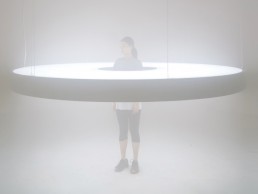
Light Collective to host Collected Light exhibition
(UK) – Comprising five artworks created by six different female artists, Collected Light is an intimate showcase of work by women light artists curated by Light Collective.
Held from 14-25 November at the SoShiro Gallery in London, the exhibition will feature a range of mediums, from neon to projection, with works from Kate McMillan (UK/AU), Karolina Halatek (PL), Jacqueline Hen (DE), Tamar Frank (NL), Lauren Baker (UK), and Chila Kumari Burman Singh (UK) on display. The exhibition is supported by formalighting.
In 2019, Light Collecteve started the global project, Women in Lighting, also supported by formalighting, creating a huge community and network of women around the world working with light. Collected Light is part of the project, and the start of the creation of a permanent collection made solely of women light artists. After the London event, the exhibition will tour other cities, with the addition of more women light artists.
The artworks on show are:
In Lucem, 2019 by Tamar Frank: A series of 20 small light panels illustrate – four of which are on display at this exhibition – a seemingly still image with a central focus that gradually blends into different colour compositions. The colour gradients are inspired by the changes in natural light over the course of one day and change very slowly so that the transition itself is not perceived. The artwork is a response to the perception of light as a natural presence. The central focus invites the spectator to slow down and allow the light to draw the viewer in. The diffusion of the image does not allow the eye to focus. As a result, the image will appear to pulsate and float.
Peacock, 2020 by Chila Singh Burman: Burman is celebrated for her radical feminist practice, which examines representation, gender and cultural identity. Peacock was part of the hugely popular neon installation on the exterior of the Tate Britain, Remembering A Brave New World in 2020. She explained: “My Peacock piece explores the birds’ symbolism of re-growth, rejuvenation, beauty and love. The peacock is native to the Indian subcontinent, in this way it is also a reference to my Indian heritage.” Burman works across a wide range of mediums including printmaking, drawing, painting, installation and film.
Halo, 2019 by Karolina Halatek: The circular-shaped immersive installation is designed to draw out a very personal experience. Visitors interacting with the work have the possibility of discovering a new dimension of their own presence in the contemplative, pure and abstract environment. The title refers to the natural optical phenomena seen around the sun or moon, produced by light in the interaction of ice crystals. The place of the celestial body is given to the art viewer, who becomes a central part of the piece. Halatek is a Polish artist who uses light as a catalyst for experience. She often collaborates with non-artists including quantum physicists, founders of the superstring theory (Leonard Susskind, Roger Penrose, Carlo Rovelli) and precision mechanical engineers.
The Lost Girl, 2020 by Kate McMillan: The Lost Girl is an immersive film-based installation centred around the fictional character of a cave-dwelling girl on the east coast of England. Using DH Lawrence’s book of the same name as a starting point, the film narrates the experiences of a young woman seemingly alone in a dystopian future, with only the debris washed up from the ocean to form meaning and language. The film combines McMillan’s various research interests, including the Anthropocene; the role of creativity in forming memory and the consequences of neglecting female histories. McMillan is based in London and is the author of the annual report ‘Representation of Female Artists in Britain’ commissioned by the Freelands Foundation.
Off Grid Series, 2022 by Jacqueline Hen: This installation investigates the perception of the body in space in the face of the digital realm. How is social media influencing our perception and interaction with the physical space? Mirrors and an arrangement of lights create the illusion of an infinite space of luminosity and darkness. The perception of this space changes with the viewer’s perspective inviting them to investigate their self within infinity.
Stardust – The Deep Field (Lenticular), 2018 by Lauren Baker: A six-image lenticular backed by an LED light box, described by Baker as depicting ‘a galactic explosion of shooting stars and space matter’. Because of the way the lenticular lenses shift how the images are perceived, moving past the artwork brings it to life: suggesting a celestial dance of explosion and implosion, separation and unison, change and repetition. The artwork depicts a galactic explosion of shooting stars and space matter, inspired by the findings of the Hubble telescope. Hubble’s glimpse into what is known as the deep field has highlighted that we are just one tiny part of a vast system comprising of 100 billion galaxies. As people walk past, the six images appear and merge into one another from different angles, creating a moving image of an exploding star.
All the artists are featured in a new book of the same name also curated by Light Collective. The duo share their reasoning for both the book and the exhibition;
“After 25 plus years in the world of light, it became apparent, that there is an onus on and huge visibility of male artists who work with or have worked with light within their body of work. Many are well known names and are often cited as inspiration in the work of lighting designers. While there are a few names that come up when discussing female light artists – the financially successful artist; Yayoi Kusama, the political rebel; Jenny Holzer and lover of daylight; Nancy Holt, like the rest of the art world, the exposure of their work is less and our knowledge of light artists remains unbalanced in terms of gender. If you want to prove this further, just type the words “Light Artist” into Google – out of the first 15 artists shown by the world’s leading search engine only two are female.”
The Women in Lighting project inspired Light Collective to look at all aspects of representation in the field of light. They found and researched over 150 women creating light-based art, which led to the curation of a book: Collected Light Volume 1: Women Light Artists. The book is a small step towards trying to redress the unfair imbalance in visibility and will be available for purchase at both the exhibition and online, after the event has finished.
Light Collective asked more than 40 women to participate by sharing images of their work. From immersive environments to reactive light, beautiful glowing objects to light that tells a story, this collection of light art from women artists includes a multitude of manipulations of the medium. Directing the viewer to contemplate colour, nature, politics, life and even death, the true power of light as an artistic medium is perfectly portrayed by the artists included.
“Our hope is that by profiling these women artists who use light within their work, we are opening a door for others to do the same and for all to be celebrated and widely known for what they create. We also hope that the beauty of each piece of work offers inspiration to those who discover it and, whilst created by women, is valued as incredible art, non-dependent on gender.”



